Recognizing that metrics drive practices in the academy (and elsewhere), we on the HuMetrics: Building a Humane Metrics for the Humanities team at this year’s Triangle Scholarly Communications Institute decided to approach our work by thinking first about the values that inform enriching scholarship.
This approach is consistent with the work we are doing at Michigan State University about how the mission of the university can be translated into institutional habits that inform our research and pedagogical practices.
The gesture to “habits” here harkens back to the ancient Greek idea that character expresses itself the things we do each day and the ways we do them. For Aristotle, a habit is a hexis, an active condition of the soul cultivated intentionally over the course of a life to empower us to live well.
Intentionally cultivating habits of enriching scholarship ought to empower us to create better — that is more just, equitable, and (yes, Jason Rhody) excellent scholarly communities.
Turning our attention first to the values we’d like to cultivate in and through our scholarly practices before thinking about how we might measure high-quality scholarship should enable us to identify measurable indicators of the quality of the sort of scholarship we would like to advance.
To do this, of course, requires us to think first about the values we care about and how those values are put into practice. We spent a good period of time today considering values, practices, products, and metrics as we attempted to lay out for ourselves the sorts of values and practices we associate with scholarship that enriches the world we share.
This post, and those of my teammates — Nicky Agate, Jason Rhody, Rebecca Kennison, Stacy Konkiel, Simone Sacchi — are designed to put one of the things we value into practice, namely, public reflection on emerging scholarship. So rather than simply reflecting in private here at the Rizzo Conference Center in Chapel Hill, we agreed to write reflectively on our work as it unfolds. This is more than a simple exercise, in my view, but rather, an important way to undertake the scholarship itself.
If metrics determine practice, perhaps practice can help shape our thinking about metrics. How might we measure the sort of open, public, generous, engaged, sound, just, and engaging scholarship to which we aspire?
Follow team #HuMetrics as we wrestle with humanities metrics. We are Christopher Long, Rebecca Kennison, Stacy Konkiel, Simone Sacchi, Jason Rhody, and Nicky Agate, and we’ll be writing here all week.
